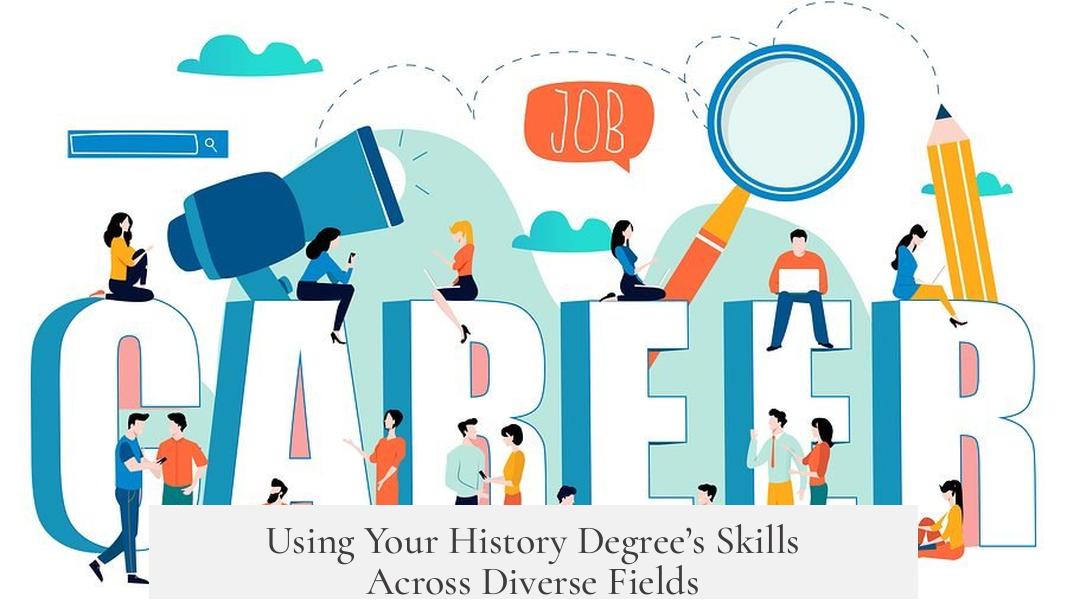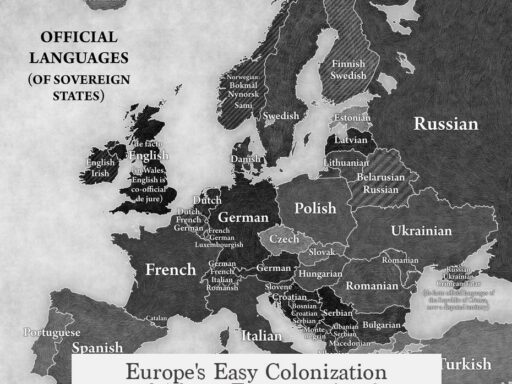A history degree opens career paths in both traditional historical fields and diverse industries. It equips graduates with research, writing, and analytical skills employers widely value. Potential professions span from archival work and teaching to finance and law.
Many students with history degrees enter roles directly related to history and heritage. Examples include:
- Archival Work and Librarianship: Archiving and managing historical documents appeals to those who enjoy preservation and research. Specialized qualifications are often required. Work can involve assisting researchers, organizing collections, and digital curation.
- Museum and Park Services: Museums, national parks, and historical sites employ history graduates as guides, curators, or researchers. These roles blend education with public outreach, often requiring strong communication skills.
- Teaching and Academia: Becoming a history teacher or professor is common. University faculty engage in lecturing and extensive research to contribute new historical knowledge. Fluency in foreign languages and graduate degrees enhance prospects, especially in competitive academic settings.
- Cultural Resource Management: This field involves evaluating buildings or sites for historical significance. Jobs often require combining research skills with regulatory knowledge, such as listing properties on national historic registers.
- Living History and Archaeology: Living history interpreters create immersive experiences at historic sites. Archaeologists and land use planners analyze artifacts or balance development with conservation efforts.
Beyond history-specific roles, the degree’s core skills unlock diverse jobs. History students develop:
- Strong written and oral communication
- Critical analysis and source evaluation
- Research and data synthesis
- Project planning and problem solving
These abilities make history graduates competitive for positions across sectors.
| Industry | Example Roles | Key Skills Used |
|---|---|---|
| Finance | Investment research, asset analysis | Analytical thinking, research, communication |
| Law | Litigator, legal researcher | Research, argumentative writing, critical thinking |
| Technology | Product manager, technical writer | Communication, project management, documentation |
| Project Management | Construction manager, program coordinator | Planning, analysis, communication, problem solving |
| Government and Public Administration | Policy researcher, contract administrator | Research, writing, evaluation, organization |
| Digital Marketing | Content strategist, marketing analyst | Research, content creation, communication |
| Non-Profit Fundraising | Prospect researcher, development officer | Research, data analysis, relationship building |
Many careers require additional training beyond a history degree. For example:
- Librarians and archivists often need specialized graduate degrees or certifications.
- Teaching roles at the university level usually demand advanced degrees and may require foreign language fluency.
- Some fields, such as law or public policy, may require professional school or further graduate study.
History graduates who pursue further education tend to specialize in areas such as digital humanities, archival science, or language studies. This enhances employability and opens niche careers in research or cultural preservation.
A history degree acts as a foundation rather than a direct career ticket. Its greatest value lies in transferable skills. Graduates are adept at digesting complex information, synthesizing evidence, and communicating clearly. These capabilities appeal to employers in multiple sectors.
When considering career paths, individuals should reflect on their interests and desired lifestyles. High-paying jobs may require additional education or training. Flexible roles may be found outside traditional history fields. The degree provides a stepping stone, not a limit.
Many employers, including large corporations and government agencies, prefer candidates with degrees for the skills and discipline demonstrated. Graduates have succeeded in varied fields without working directly in history.
Key takeaways:
- History degrees prepare graduates for careers in archives, museums, teaching, cultural resource management, and archaeology.
- Transferable skills enable employment in finance, law, tech, government, project management, marketing, and non-profits.
- Further qualifications often required for specialized roles like librarian or professor.
- Strong research, analysis, and communication skills remain the core value of the degree.
- Career choice should align with personal interests, lifestyle goals, and willingness to pursue additional education.
What Professions Can I Pursue With a History Degree?

If you’re holding a history degree, the range of professions you can step into is surprisingly broad. Many imagine historians are confined to dusty archives or university lecture halls. The reality? A history degree equips you with skills sought after in diverse fields. Whether you prefer dealing with ancient manuscripts, managing projects, or diving into finance, your history background is a solid foundation.
Let’s embark on a journey through the landscape of career options for history graduates. You’ll find traditional history roles, surprising detours into finance and tech, and advice on how to leverage your skills for success.
Traditional Roles That Embrace History
First stop: the most obvious – the jobs where your history degree directly fits like a glove. Archival work, museums, teaching, cultural resource management, and living history interpretation present fulfilling options.
- Archival Work and Librarianship — If you love being around historic documents, this can be your bread and butter. But note, in many places you’ll need specialized qualifications beyond your bachelor’s degree. A master’s or certification in library science or archival studies usually unlocks these doors.
- Museum and Park Services — Think museum curators, park rangers, and educational staff. Museum jobs let you research and share history. Working with national or regional parks can be rewarding, especially if you appreciate the outdoors. Be warned: these fields can attract many candidates, and the pay isn’t always princely.
- Teaching — Whether you aim to become a middle school teacher or a university professor, history offers a clear path. Professors do more than teach; they research and publish. High-tier universities demand publishing peer-reviewed articles, which might appeal if you crave depth and detail.
- Cultural Resource Management — Ever thought about evaluating old buildings for historical importance? Architectural historians do exactly that, working with heritage sites to preserve history’s physical footprints.
- Living History Interpretation — This isn’t just glorified tour guiding. It involves maintenance, research, and portraying historical characters accurately, often at historical sites or re-enactments.
- Archaeology and Land Use Planning — In places like Canada, archaeology related to new developments is a solid industry. With a history degree, you can also specialize in heritage planning within land use, blending environmental and historical conservation.
Are you picturing yourself in any of these roles? If yes, consider looking into graduate studies or certificates that provide specialized training. Many employers demand these extra qualifications.
Using Your History Degree’s Skills Across Diverse Fields

The real magic of a history degree lies in the transferable skills: research, communication, critical thinking, and analysis. These make you valuable far beyond the scope of historical jobs.
- Finance — History grads have successfully pivoted into finance roles. Take investment research or financial sales, where analysis and precise communication are prized. For example, one history major doubled down with a professional designation and now thrives in investment research.
- Law — Law school and litigation fit history graduates naturally. The daily grind of research, drafting arguments, and scrutinizing documents mirrors historical work. If you enjoy digging through old records and building cases, the courtroom might become your new stage.
- Tech Industry — You might not expect it, but history grads thrive as product managers and other tech roles. Crafting coherent documents and emails, akin to constructing argumentative essays, becomes surprisingly useful here.
- Project Management — The ability to analyze diverse sources, spot inconsistencies, and summarize conclusions is a built-in “bullshit detector.” Project managers in construction or government sectors appreciate these skills to navigate complex projects.
- Government and Public Administration — Whether investigating labor complaints or serving as a Transportation Assistant, history graduates fit well in public sector roles. Policy research, contract management, or civil service positions often welcome a history background.
- Librarian — Beyond archives, consider special collections librarianship. It blends historical knowledge, technical skills, and research for various patrons, from students to lawyers.
- Digital Marketing — Believe it or not, some history majors found their stride in digital marketing by being early adopters of the web and leveraging their research and writing to produce authoritative content.
- Non-profit Fundraising — Prospect research in non-profits is a niche that suits history grads well. Digging through records to identify potential donors taps directly into your research training.
Surprising? It might be, but it makes sense when you realize how much employers crave strong writing, critical thinking, and research. History teaches you to handle big piles of information and communicate it clearly — and that’s gold in any sector.
The Path Forward: Specializing and Further Education
But what if you want to deepen your expertise or access roles that require advanced credentials? Here’s some guidance:
- Specialist Qualifications — Becoming a librarian or archivist usually means getting a specialized degree or certificate. If interested, seek summer internships or entry-level roles to get your foot in the door.
- Language Skills — Fluency in a foreign language, especially if you can read old documents independently, can open up academic and historical career paths that are otherwise very competitive.
- Graduate School Realities — Be prepared: graduate school in history does not guarantee a high-paying job. The academic path is increasingly challenging, requiring passion and persistence. Consider combining history with public policy, law, or digital humanities for more career flexibility.
Wrangling With Career Decisions: What Matters Most?

Here’s the big question you need to wrestle with: what do you enjoy doing, and what kind of life do you want?
If work-life balance and remote options matter most, your career choices will differ from someone prioritizing a high salary and a prestigious position. Some might dream of a quiet life as a museum curator; others aspire to the buzz of corporate finance or the legal arena.
Remember, the history degree is a *stepping stone*, not an unyielding fence. Many employers won’t consider candidates without a degree regardless of the major. Your history degree provides a crucial passport to get through the door and onboard, no matter where you choose to go.
Real-Life Examples That Inspire
Consider this: one history graduate who never worked close to history professionally credits the degree with landing their dream job in an unrelated field. Another found immense satisfaction working as a project manager, using their history skills to question narratives and verify facts daily.
Some graduates pivot entirely but rely on their storytelling ability. One history major became a product manager where their knack for well-crafted communication shines on product docs and emails. Others ventured into public policy, combining a love of social history with government work.
Looking further afield, consider the adaptability a history degree fosters. For example, one graduate ended up in finance, using their analytical skills and experience with vast information sets to excel in asset sales and investment analysis. Their journey shows how history training helps you decode complexity and anticipate trends — just like reading history’s patterns.
Summary: Your History Degree Opens Many Doors

| Profession | Description | Additional Training Needed? | Key Skills Utilized |
|---|---|---|---|
| Archivist/Librarian | Preserve and manage historical documents, assist research | Usually yes (library science or archival studies) | Research, organization, analysis |
| Museum or National Park Staff | Educate public, manage collections, conduct research | Sometimes (specialization or experience) | Communication, research, public speaking |
| Professor/ Lecturer | Teach history and conduct research at university level | Yes (usually PhD) | Research, writing, critical thinking |
| Lawyer/ Legal Analyst | Use research and argumentation skills in legal contexts | Yes (law degree) | Research, writing, critical analysis |
| Finance/ Investment Researcher | Analyze assets and markets | Sometimes (professional finance certifications) | Analysis, communication, critical thinking |
| Project Manager | Oversee projects, manage resources and teams | No (experience recommended) | Planning, problem-solving, communication |
| Digital Marketer | Create content, strategize online campaigns | No (experience preferred) | Writing, communication, research |
| Public Policy Analyst | Research and write on government policies | Recommended (graduate degree) | Research, writing, critical thinking |
In Closing: Embrace Your Degree’s Versatility
Here’s the bottom line. Your history degree is a tool that sharpens your ability to research, communicate, and analyze. You may not always end up working in museums or archives, but the skills you get are prized everywhere.
So, what will you choose? Will you become a curator of hidden stories? A financial analyst with a historian’s insight? Or a legal eagle, weaving compelling arguments from old texts? Or maybe a project manager who sniffes out inconsistencies like a 21st-century historical detective?
History majors, your degree is more than a testament to your love of the past: it’s a versatile passport to your future.
What types of roles in museums and parks can history graduates pursue?
History graduates can work as museum staff, tour guides, archivists, or park service employees. These roles often involve research, public interaction, and educating visitors about historical sites and artifacts.
How can skills from a history degree apply to careers outside of traditional historical fields?
Key skills include research, writing, communication, and analysis. These skills fit well in finance, project management, law, and even tech product management, where clear communication and critical thinking are valued.
Is law a common career path for history graduates and why?
Yes. History graduates are skilled at research, reading complex documents, and constructing arguments. These skills directly translate to legal professions, making law a fitting option for many with history degrees.
What is Cultural Resource Management and how does it relate to a history degree?
Cultural Resource Management involves evaluating historical sites and buildings for preservation. History graduates research and assess historical significance, helping protect cultural heritage through this work.
Can history graduates work in government roles, and what do those jobs involve?
History graduates can work in various government positions, such as labor complaint investigators or administrative assistants. These roles use skills in research, organizing information, and drawing evidence-based conclusions.



